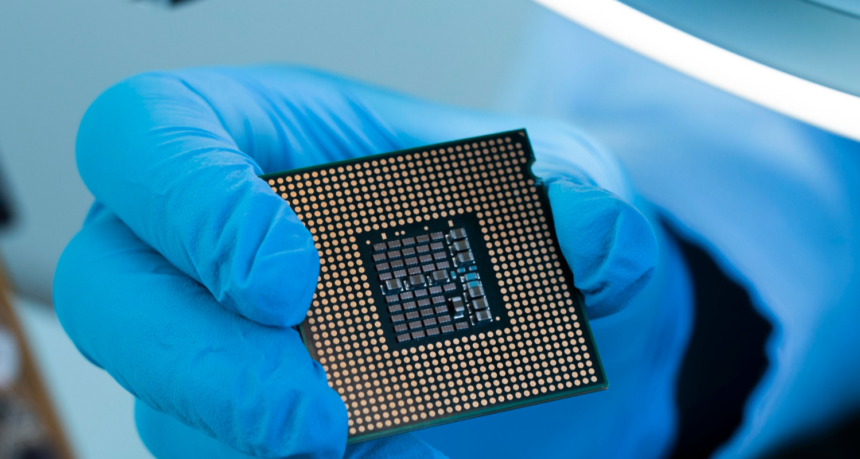Semiconductors are everywhere! These essential hardware components power everything from basic switching circuits to advanced devices like computers, smartphones, and medical equipment, ensuring they function and respond accurately to user commands. As semiconductor companies continue to improve their technologies, devices of all kinds will improve too, opening up new possibilities across all fields.
For example, Intel’s self-learning neuromorphic chip, Loihi, mimics how the brain functions by learning to operate based on feedback from the environment. This innovative hardware, combined with AI algorithms, can significantly enhance efficiency in various applications, from predictive maintenance in manufacturing to advanced healthcare diagnostics.
Let’s see 5 such semiconductor companies that have delivered next-gen semiconductor hardware and become the semiconductor industry’s big name.
NVIDIA
- Market Cap: Approximately US$3.31 trillion, as of 27 November 2024.
- Headquarters: Santa Clara, California, USA
- Key Products: NVIDIA GeForce Graphic Cards (gaming and tech), Grace Hopper Superchips, A100 and H100 Tensor Core GPUs
Currently, NVIDIA is dominating the AI and high-performance graphics processing units (GPUs) sector like a true market leader. Renowned for its GeForce and Tesla product lines, NVIDIA’s chips are integral to gaming, AI training, and data centers worldwide.
Its H100 and A100 Tensor Core GPUs, used for AI model training, are trusted by companies like Google and OpenAI and serve industries ranging from healthcare to robotics. Recent figures from Mizuho Securities estimate that NVIDIA controls between 70% to 95% of the market for AI Chips used to train and deploy models like OpenAI’s GPT, contributing to its market leadership. The release of its Grace Hopper Superchip in 2024 further cemented NVIDIA’s position as a pioneer in AI-driven hardware solutions.
TSMC (Taiwan Semiconductor Manufacturing Company)
- Market Cap: Approximately US$939.75 billion892 billion, as of 271 November 2024.
- Headquarters: Hsinchu, Taiwan
- Key Products: automotive and AI-specific chips, 3nm and 5nm process nodes,
TSMC is a chip foundry from Taiwan. It is a semiconductor company that manufactures chips for companies that can’t or won’t produce chips themselves, including Nvidia. In the first quarter of 2024, TSMC had a revenue-based market share of 62 percent, a testament to its dominance in the semiconductor foundry field.
TSMC serves tech industry giants such as Apple, MediaTek, AMD, and Qualcomm, and is known for manufacturing 5nm and 3nm chips. Since 2024, TSMC is set to expand its operations globally. They built the first fab factory in the Japanese city of Kumamoto. They are planning to build two facilities worth US$40 billion in Phoenix, Arizona and committed to invest another US$3.7 billion for the first-ever TSMC fab in Dresden, Germany.
Broadcom
- Market Cap: Approximately US$745.75782 billion, as of 271 November 2024.
- Headquarters: Palo Alto, California, USA
- Key Products: Wi-Fi 6 and Bluetooth 5.0, 5G components, Networking and communication solutions
Broadcom is a semiconductor company leading the market in connectivity solutions by designing, developing and supplying a broad range of semiconductors along with enterprise software and security solutions. This global leader in infrastructure software and semiconductor solutions provides essential components for broadband, wireless communications and data center infrastructure. With Wi-Fi 6, Bluetooth, and 5G solutions embedded in everything from smartphones to enterprise networking systems, Broadcom’s influence is substantial in the field of semiconductors.
Broadcom’s acquisition of VMWare in April 2024, a software company that specializes in virtualization and cloud computing, is a landmark event and it will bring significant changes across the globe for Managed Service Providers (MSPs). Not only semiconductor but Broadcom’s acquisition of VMWare also suggests the company wants to enhance its presence not only in semiconductor manufacturing but also, in the competitive enterprise software domain.
ASML (Advanced Semiconductor Materials Lithography)
- Market Cap: Approximately US$263.63327 billion, as of 211 November 2024.
- Headquarters: Veldhoven, Netherlands
- Key Products: Deep ultraviolet (DUV) lithography systems, EUV
ASML is a unique semiconductor company that enables companies like Intel to produce their microchips. It’s a common misconception that ASML produces microchips or ICs (integrated circuits). But in reality, they are the sole supplier of extreme ultraviolet (EUV) lithography machines which are essential components for producing advanced chips.
ASML’s Its technology and its collaboration with helps companies like Intel is a driving force to produce high-density chips required for AI, 5G, and other next-gen applications. Not only Intel but there’s a demand for ASML’s EUV technology among all the leading semiconductor manufacturing companies like TSMC and Samsung, making ASML a linchpin in the semiconductor supply chain.
Samsung
- Market Cap: Approximately US$275.78304 billion, as of 281 November 2024.
- Headquarters: Suwon, South Korea
- Key Products: Exynos mobile processors, DRAM, NAND flash memory
Samsung is a powerhouse in both memory and advanced logic semiconductors. This electronic and semiconductor company operates under two core divisions: DX (Device eXperience), which includes businesses for Visual Display, Digital Appliances, Mobile eXperience, Networks, and Health & Medical Equipment; and DS (Device Solutions), which consists of Memory, System LSI, and Foundry businesses.
Founded in 1969, this semiconductor company dominates sectors like mobile devices, data storage, and automotive. Samsung’s components, such as DRAM and NAND flash memory, are crucial to the global computing infrastructure. With clients spanning consumer electronics, cloud computing, and automotive, Samsung’s diversification strategy makes the company competitive in the global market.
Conclusion
The semiconductor industry is progressing at an astonishing speed. Among 470 semiconductor companies in the world, it’s not easy to grab the first five positions based on market cap. Nevertheless, these companies are always proving themselves, from NVIDIA’s breakthroughs in AI processing to TSMC’s unparalleled manufacturing capabilities and ASML’s specialized equipment, these companies are shaping the future of technology. By enabling advancements in AI, connectivity, and high-performance computing, they are not just meeting today’s needs but paving the way for tomorrow’s innovations.









